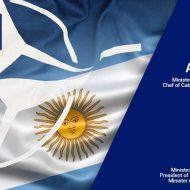“The U.S. decision gives the opportunity for much broader discussions on bilateral relations”, comments Roy Daza. He is referring to the Biden Administration’s recent decision to permit the US company Chevron limited activities in the Venezuelan oil sector.
Daza is Vice-President of the Venezuelan National Assembly’s Commission for Foreign Policy and a Member of the governing United Socialist Party of Venezuela’s (PSUV) International Commission.
I spoke with Daza in Mexico about how Venezuela is breaking the diplomatic isolation, the Venezuelan – Colombian relations and prospects of Latin American integration. The interview was made in person before the mentioned US decision, and Daza sent a fast evaluation of it via phone.
“The people of Venezuela defeated Trump’s strategy”
The Bolivarian Republic of Venezuela has recently started to break the diplomatic encirclement imposed by the U.S. How did that happen?
The US imposed diplomatic encirclement, accompanied by actions of the Lima Group and the Organization of American States (OAS) has failed. This has to do with the domestic situation of our country.
Between 2019 and January 2021, we have dealt the greatest blow to the strategy of the United States.
They had planned the following: the economic blockade against us, the military invasion of our country and the destruction of our republic and revolution, followed by the reestablishment of the neoliberal dictatorship.
This attempt was defeated primarily by the patriotic consciousness of the Venezuelan people under the guidance of President Maduro and the revolutionary leadership. Popular movements, the workers, the civic-military union; they all united. In summary, the people of Venezuela have defeated the strategy of Trump.
Secondly, the opposition in Venezuela got divided. A part of it signed an agreement with the government on September 16, 2019, which is still in force. This agreement enabled the election of the National Assembly and the re-institutionalization of the country.
The attempt to establish a parallel government in our country is today not more than a joke. The basic state institutions are all reinstated and working.
Hence, our struggle today is directed against the economic blockade and for the recovery of the resources that the U.S. and its domestic allies have robbed from the Republic.
Are changes on the continent also part of an explanation for this overall diplomatic normalization?
Evidently, with the electoral victory o Lopez Obrador in Mexico in July 2018, a new situation emerged in Latin America, on the basis of the strategic alliance between Venezuela and Cuba and the resistance of the ALBA.
The victories of Alberto Fernandez in Argentina and Gustavo Petro in Colombia followed, in a context where neoliberalism was failing. Thus, the correlation of forces is now very different from before.
Venezuela and Colombia
Speaking of Colombia: the restoration of diplomatic ties between neighboring countries seems to be very important. How do you evaluate it? What does Petro’s victory mean for you?
It means that Uribismo is defeated. Petro has established a very broad alliance with a broad social support. Now, diplomatic relations are being restored, economic relations are revived and border issues are cleared.
Imperialism has never been able and never will be able to divide the Venezuelan and Colombian people, because we are sons and daughters of the same father: Simon Bolívar.
Are you not worried that paramilitary groups in Colombia might sabotage the process between Colombia and Venezuela? And what says Washington to it?
Some groups might take certain steps to pursue such sabotage. But I don’t think that they find the according political conditions to do that. I think that the Presidents Maduro and Petro are very decided to advance this process.
Besides, these groups only can pursue acts of delinquency, not more. And the process between Colombia and Venezuela is progressing even faster than expected.
Concerning Washington: The United States has to understand that Venezuela is an independent country – and they have to treat us as such. And regarding our new relations with Colombia, they have kept silent until now.
Return to Mercosur is “on the agenda”
Returning to Latin American integration and Venezuela’s place in it. Do you think that new opportunities emerge for Caracas?
Surely. For instance, the return of Venezuela to Mercosur, or better said, the completion of its accession process is on the agenda. Similarly, the Bolivia’s membership in the organization has also been proposed.
Generally, the conditions are very positive for a revival of Latin American integration. Here, the situation in Brazil is of great importance.
How do you evaluate the relations between Türkiye and Venezuela? Can they progress further with advancing Latin American integration?
Relations between Türkiye and Venezuela do not depend on the progress of Latin American integration. Commandante Hugo Chávez, who had a very clear vision on the global geopolitical changes, established these long ago. And President Maduro continued them. Hence the relations between our countries are thriving.
And Türkiye for its part has never broke relations with Venezuela, quite the contrary, has always taken a very friendly stance.
Now, Venezuela might not only be a gateway for Türkiye to Latin America. We can develop joint stances in a number of issues, for instance, within the Mercosur. We have to look for complementarity in economic relations and take advantage of these to advance relations further.
On Biden’s Chevron decision
Lastly, how do you evaluate the US administration’s recent decision on Chevron?
The US administration has decided to loose some of the coercive measure it had in force for a long time. This decision concerns Chevron, a company that maintained relations with the Venezuelan oil industry for a long time.
We think this marks a new moment in the relations with Chevron specifically and with the U.S. generally, because it gives an opportunity for a much broader discussion concerning different economic and political problems that exist in bilateral relations.









Leave a Reply